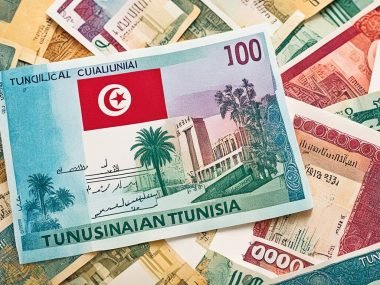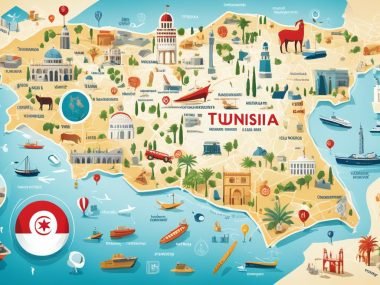Did you know Tunisia spent over $22 billion on imports in 2021? Imports are very important for the country. They made up 59.21% of Tunisia’s GDP in 2022. Because the country buys more than it sells, it had a trade deficit. In 2021, this was about $5.8 billion. This shows how crucial imports are for Tunisia’s economy.
Key Takeaways
- In 2021, Tunisia imported goods worth $22,496,204,948.
- Tunisia’s trade deficit for that year was a staggering ($5,801,006,307).
- Imports accounted for 59.21% of Tunisia’s GDP in 2022.
- Such significant import statistics highlight Tunisia’s reliance on external goods and services.
- This extensive import landscape plays a vital role in the country’s market economy.
Overview of Tunisia’s Import Economy
Tunisia stands as the 71st biggest importer in the world. It buys a variety of goods from abroad. This shows its wide connections in trade and economics.
Key Statistics and Metrics
The country depends a lot on products from other countries. In 2021, its main buys were oil, electrical gear, and heavy machinery. These are key to its energy needs and industry growth.
| Year | Top Imports of Tunisia | Import Value (in USD Billions) |
|---|---|---|
| 2021 | Oil & Mineral Fuels | 3.2 |
| 2021 | Electrical Machinery | 2.5 |
| 2021 | Industrial Machinery | 1.8 |
Major Trading Partners
Tunisia trades a lot with Italy, France, and China. Germany, Turkey, and Spain too. These countries help meet Tunisia’s needs by supplying various goods.
Tunisia’s buying trends are strong and keep changing. They shift with the world economy and what the country needs.
Energy Commodities
Energy commodities are very important for Tunisia’s economy. They make a big part of what the country buys from others. Tunisia import products mostly include oil and mineral fuels. These are essential for the country’s energy needs and its economic health.
Oil and Mineral Fuels
Oil and mineral fuels are among the top popular imports in Tunisia. In 2021, Tunisia spent a lot of money on these, about $3,138,522,926. This shows how much the country relies on them for its industry and everyday life.
The National Oil Company of Tunisia has a very important job. They make sure Tunisia gets these energy resources well. They always check costs and quality. This helps Tunisia stay in line with the world’s changes.
Natural Gas and Renewable Energy
Tunisia is also looking at other types of energy. Buying natural gas is a big part of this plan. It helps the country use less oil and have cleaner air.
Furthermore, Tunisia is spending a lot on renewable energy like solar and wind. These efforts aim to make energy last longer and help the country grow. By using more renewable energy, Tunisia wants to secure its energy future and be more green.

| Energy Commodity | Import Value (2021) | Significance |
|---|---|---|
| Oil and Mineral Fuels | $3,138,522,926 | Primary source of industrial and domestic energy |
| Natural Gas | Substantial | Alternative energy source and cleaner fuel |
| Renewable Energy | Increasing | Focus on sustainability and energy security |
Electrical Machinery and Equipment
In 2021, Tunisia spent $3,096,258,920 on electrical machinery and equipment. This big spend shows its plan to make its infrastructure modern. And, to use more advanced technology.
High Demand for Electrical Components
Tunisia’s growing need for electrical parts shows. These are key for many areas, like electronics for everyday use and for communication tech. The country aims to bring in top-notch electrical items. This helps with its tech growth and making its infrastructure better.
Import Trends in Electronics
A look at Tunisia’s imports highlights a big move towards electronics. The list includes everything from simple to complex electronic gadgets. These trends reveal Tunisia’s goal to modernize. They also show it’s keeping up with the world’s tech moves.
| Category | Value (USD) | Description |
|---|---|---|
| Electrical Machinery | $1,850,000,000 | Includes basic and advanced machinery for diverse industries |
| Consumer Electronics | $720,000,000 | Mobile phones, laptops, and home appliances |
| Telecommunication Equipment | $526,258,920 | Routers, servers, and other networking hardware |
Industrial Machinery
Industrial machinery is very important in Tunisia, especially for making things and textiles. In 2021, Tunisia bought a lot of industrial machinery, costing $1,700,160,017. This shows how these imports help Tunisia grow its industry and economy.
Machinery Types and Usage
Here are the kinds of machinery Tunisia brings in:
- Heavy-duty manufacturing machines
- Textile production equipment
- Assembly line automation
- CNC machinery
- Agricultural machinery
This machinery helps Tunisian industries do their work better, faster, and compete worldwide. It’s key for making goods for both local and global buyers.
Impact on Tunisian Industries
Bringing in industrial machinery really helps many parts of Tunisia’s economy. Key areas are:
- Manufacturing
- Textiles
- Agriculture
For example, making things gets quicker, and making textiles gets better and more consistent. Also, farming becomes more modern with these machines.
The Tunisia trade statistics show how important these imports are. They help several industries in Tunisia keep growing and stay competitive. By getting new machinery often, Tunisia keeps making progress and meets global standards.
| Sector | Machinery Type | Impact |
|---|---|---|
| Manufacturing | Heavy-duty manufacturing machines | Increased productivity |
| Textiles | Textile production equipment | Enhanced product quality |
| Agriculture | Agricultural machinery | Streamlined farming activities |
Consumer Goods
In Tunisia, people love many foreign products. This love impacts the country’s economy a lot. They like things from cars to clothes.
In 2021, cars and their parts were very wanted. This shows that people there like to buy car products. And it tells us that stores selling cars might do very well. It also shows us how the middle class is growing. We learn what these people like to buy.
| Category | Product Examples | Import Value (2021) |
|---|---|---|
| Automotive | Cars, Motorcycles, Spare Parts | $1.2 Billion |
| Textiles and Apparel | Clothing, Fabrics, Footwear | $800 Million |
| Household Appliances | Refrigerators, Washing Machines, Microwaves | $600 Million |
| Electronics | Mobile Phones, Laptops, Televisions | $900 Million |
Looking at the table, you can see Tunisians like a mix of things. From cars to gadgets, they spend a lot on these. This means brands from other countries have a good chance to do well in Tunisia.
Raw Materials and Semi-FinishedProducts
Tunisia needs to import raw materials and semi-finished products for its factories. These items are crucial for many sectors, like building and making consumer goods. They play a big role in Tunisia’s economy and its growth.
Plastics and Polymers
Plastics and polymers are very important for Tunisia. They are used in many industries, such as packaging, cars, and electronics. In 2021, Tunisia spent about $1,460,409,989 on plastics. This shows how much the country needs these materials.
Iron, Steel, and Other Metals
Iron, steel, and other metals are key for Tunisia. They are used a lot in building, making machines, and improving infrastructure. In 2021, Tunisia bought iron and steel worth $906,889,622. These materials are very important for Tunisia’s industry and economy.
Here is a table that shows the main raw materials Tunisia buys and how much they cost:
| Material | Import Value (2021) |
|---|---|
| Plastics and Polymers | $1,460,409,989 |
| Iron and Steel | $906,889,622 |
Agriculture and Food Products
The agriculture sector is very important to Tunisia’s imports, especially for food. These imports help meet the country’s food needs. This shows clear trends in what Tunisia buys from other countries.
Cereal Imports
Cereal is a big part of Tunisia’s imports. In 2021, Tunisia bought a lot of cereals, worth about $1,230,853,368. This shows Tunisia needs cereals from other countries to meet its needs. It also shows how Tunisia relies on other places for its agricultural goods.
Vegetable Oils and Animal Fats
Vegetable oils and animal fats are also key imports for Tunisia. The country buys these to support local production. These purchases show Tunisia’s ongoing need for these items. It shows changing eating habits and needs in Tunisia.
Pharmaceuticals and Medical Equipment
Tunisia imports many things, including medicines and medical tools. In 2021, these imports were worth over $612 million. This shows how important they are for Tunisia’s health care.
Health Sector Needs
Tunisia needs lots of medical goods because of its people’s health needs. They buy everything from basic drugs to advanced machines. This helps fight diseases and care for more people.
As more people live longer, they need more health care. That’s why Tunisia keeps buying more medical items. It’s key to know this to understand Tunisia’s health care needs.
Regulatory Environment
It’s crucial that Tunisia’s medical goods are safe and work well. The country has strict rules to check these products. The Health Ministry watches over this, keeping everyone safe.
Following rules from groups like the WHO is also important. This builds trust and makes sure health care is good. It means Tunisians get safe and effective medical help, like people worldwide.
Source Links
- https://globaledge.msu.edu/countries/tunisia/tradestats – Tunisia: Trade Statistics
- https://tradingeconomics.com/tunisia/imports-by-category – Tunisia Imports By Category
- https://www.trade.gov/country-commercial-guides/tunisia-market-overview – Tunisia – Market Overview

